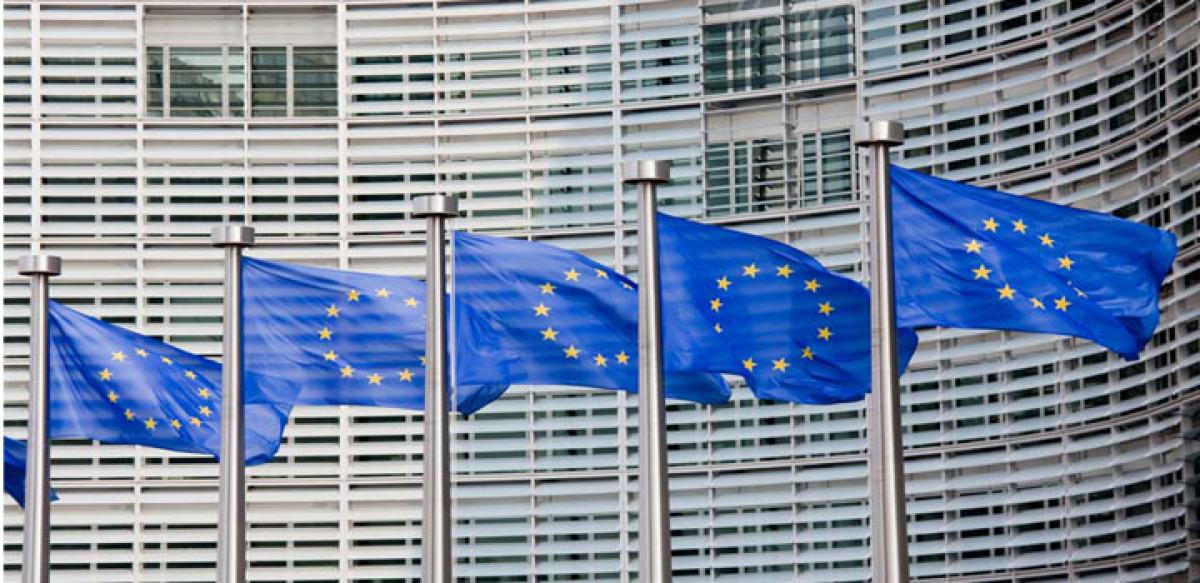Live
- Philippines orders full evacuation amid possible volcanic re-eruption
- Government Prioritizes Welfare of the Poor, says Dola Sri Bala Veeranjaneyaswamy
- Two Russian oil tankers with 29 on board damaged due to bad weather
- Telangana's Traditions Will Be Protected, Village by Village : BRS Leader MLC K. Kavitha
- Uganda to relocate 5,000 households from landslide-prone areas in eastern region
- Harish Rao Criticizes CM Revanth Reddy: "His Time is Over"
- Vijay Sethupathi Hails 'Vidudala-2' as a Theatrical Game-Changer
- Sahaj Yog: A Path to Inner Transformation and Harmony City takes giant strides
- Allu Arjun meets his uncle Nagababu at his residence
- J&K L-G felicitates Langar organisations & NGOs for contribution during Amarnath Yatra
Just In

EU ring of friends turns fiery . The European Union\'s dream of building \"a ring of friends\" from the Caucasus to the Sahara has turned into a nightmare as conflicts beyond its borders send refugees teeming into Europe.
The European Union's dream of building "a ring of friends" from the Caucasus to the Sahara has turned into a nightmare as conflicts beyond its borders send refugees teeming into Europe. In contrast to the success of its eastward enlargement drive that transformed former communist countries into thriving market democracies, the European Neighbourhood Policy launched in 2003 has been a spectacular flop.
.jpg) It offered money, technical assistance and market access, but not membership, to 16 countries to the east and south in return for adopting EU democratic, administrative and economic norms. "As we look at the situation now, it is difficult to avoid the conclusion that we are surrounded not by a 'ring of friends' - but by a 'ring of fire'," former Swedish premier Carl Bildt said earlier this year.
It offered money, technical assistance and market access, but not membership, to 16 countries to the east and south in return for adopting EU democratic, administrative and economic norms. "As we look at the situation now, it is difficult to avoid the conclusion that we are surrounded not by a 'ring of friends' - but by a 'ring of fire'," former Swedish premier Carl Bildt said earlier this year.
EU officials now acknowledge that the framework designed to engage and transform the bloc's neighbours was flawed from the outset due to a mixture of arrogance and naivety. The EU approach offered too little reward tied to too many conditions, with intrusive monitoring that authoritarian rulers and local oligarchs from Minsk and Baku to Cairo and Algiers instinctively resisted as a threat to their interests.
It set out a one-size-fits-all relationship for states with widely diverse levels of economic development and governance, most of which are ill-equipped to apply swathes of EU market, environmental or health and safety legislation. Now the EU neighbourhood policy is undergoing a fundamental rethink, with a more modest, flexible and differentiated approach due to be unveiled on November 17.
Ian Bond, a former British ambassador now at the Centre for European Reform, called the current policy a "mess of inconsistency and wishful thinking". The last review in 2010-11 had urged a focus on promoting "deep and sustainable democracy", he noted. Yet since then two countries-Libya and Syria - had fallen into near anarchy, one -Egypt - had had a military coup, and repression of civil society and the media had worsened in several, including Azerbaijan, Bond said.
EU officials talk of the need for a new realism, putting the pursuit of common interests with partners ahead of lecturing them on human rights and democracy. But the European Parliament and member states such as Germany and the Nordic countries will be loath to soft-pedal promoting such values.
Michael Leigh, a senior adviser at the German Marshall Fund think-tank and former head of the EU's enlargement department, said Brussels had responded to the 2011 Arab Spring uprisings by offering a "top-heavy, long, cumbersome, demanding" DCFTA process rather than swift but limited market access.
It would be better to offer countries like Morocco and Tunisia an immediate end to restrictions on agricultural produce such as oranges and tomatoes, he said, but farm interests in EU countries such as France, Spain and Italy got in the way. The reality is that the EU's urgent need to contain and manage the influx of hundreds of thousands of refugees from the Middle East, Asia and Africa is likely to take precedence over all other priorities in dealing with the neighbourhood.
That means Brussels will divert money earmarked for economic development and administrative reform to fund facilities to keep refugees in place and discourage them from pouring into Europe. The ring of friends will have to wait for better times. For now, what the EU wants are flood defences.
By PAUL TAYLOR

© 2024 Hyderabad Media House Limited/The Hans India. All rights reserved. Powered by hocalwire.com







